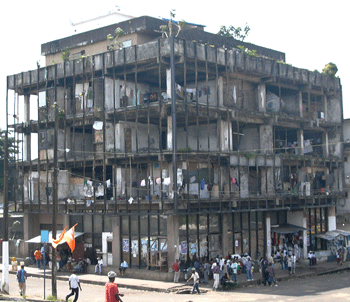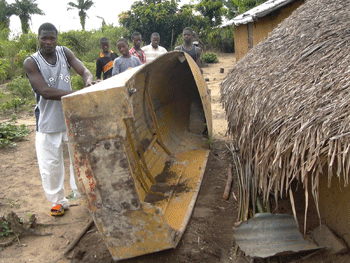
Back From Monrovia
By Abdoulaye W. Dukulé
Adukule@theperspective.org
The Perspective
Atlanta, Georgia
March 11, 2005
“What are you doing here in America? I thought you were home setting up your campaign team and everything?” I said, remembering our first conversation when he announced that he was quitting his insurance job and going home to run for president.
“Indeed, I went home, I was there for seven months. I just returned last week and I meant to call you but I have been so busy! My son got in trouble with the authorities.”
“What happened? At school or the police?”
“Not the school, the police! They locked him up but he is now out and I am taking him home. Let him go finish high school there. When he starts to walk miles everyday to school and go fetch his bath water down the road and fan off mosquitoes all night, he will get adjusted. He was getting too fat anyway!”
I asked him what his son did. I paid for my fufu and waited for him behind the cashier. He paid for his groceries and we walked away from the African store where every Saturday, scores of our compatriots buy their groceries. He told me that his son had taken his wife’s car and went out with his friends, got drunk and almost killed another driver in an accident. “I don’t know what’s wrong with our children, but he would learn a good lesson. As soon as school closes, we are on our way home. I am trying to cut a deal with the court so I take him to Monrovia.” He added that once they land in Monrovia, he would taking the boy to the village to work on the farm and do some construction work. “Next time he sees a car, he will run away!”
I sympathized with his plight and told him that everyday, tens of cases concerning young Liberians throughout the country are brought to the attention of the embassy by Immigration officials. “There are so many young Liberians in jail or being deported from this country every week, “ I said. “I don’t know what is wrong with the boy! We gave him everything! All we asked him to do was…”
As he vented his anger and frustration, I couldn’t help but think of the thousands of our youth who come to America and are thrown in the middle of an open society where every thing seems to be free. Many a times, parents don’t have the time to watch them closely, working two or three jobs to make ends meet. Children are left alone in front of the TV or in the streets with wrong ideas about what America is all about. Sometimes, parents themselves find it hard to adjust to the demands of a consumer society and the ensuing identity crisis create more confusion in the family. In the end, simple moral values are thrown out of the windows because nobody is there to remind anyone of what is important or what is not. Parents buy every new toy to make up for their absence.
He started to argue that he had worked hard to provide everything for his children. “My wife and I worked night and day, and for many years, my wife was doing sleep-in and I was working two jobs!” They are paying mortgages, two car notes and all the rest that the American society demands of a “normal family.”
And that was the point I wanted to make to him but I didn’t think it would help. Luckily, the other children had faired better, especially the girls. I remember seeing that same boy once at their house, with his pants half-way on his butt, wearing a baseball hat, so focused on watching hip hop videos that he hardly paid attention when his father introduced us. The music from the television set was so loud that we had move to the kitchen table to leave him alone in the living room. I almost asked him that day to pay attention to what his son was doing. Parents are sensitive or feel insulted whenever someone else tells them how to act with their children or when they are told that they may be doing some wrong in that line. Very few parents ever accept criticisms of any kind. Maybe I should have tested our friendship and told that kid to turn the TV off, take off his cap and put a belt in his pants and leave the room to his father and his visitors.
We took a few steps together and I decided to change subject and turn to the subject of his presidential aspirations.
 |
 |
“Look, if you were not my friend… I mean the people there… I don’t know how to start, they are like … they cleaned me up!” I said, throwing his arms up in the air.
“What do you mean clean you up?” I asked, somehow suspecting what he meant.
“They took everything I got!”
“What, you were robbed?”
“I wish that was the case! I gave them everything! My money, my clothes, my shoes, even the batteries for my radio! I mean everything! They took everything! People were at my door every morning before I woke up and they would not leave until I go to bed. Sometimes I pretended to fall asleep so they could leave! They were doing everything for me, I mean except those things I had to do myself!”
“Well, you know how people are broke at home, no job and the few who work can’t make ends meet… you…”
“My brother you don’t understand! From the time I landed at Roberstfields until I got on the plane to come back, people were behind me everywhere! Some of them started to call me Your Excellency or Honorable and I told them, ‘look, I have not gotten elected yet, so stop that thing!’ But every time I open my mouth to say something or ask a question, three or four people had the answer. If I wanted to step outside for cool air, I had five people behind me, some saying they had security training. I wanted to go to the beach and lay in the sand and go swimming but it was impossible.”
“Well what did you expect? You lived in America for some twenty years and then you jump on the plane to go home, saying you want to run for president so they expected that you had money, can you blame them?” I said.
“Don’t be sarcastic! I have never seen anything like it! I mean they have invented unimaginable ways to beg. There is no shame and no dignity! I mean the war really hit our people bad. Everyday somebody got an emergency! Either some one is facing jail or being rushed to the hospital.”
“So, now you’re happy to be back here?” I asked.
“Kind of, and I am ashamed of it! But I have learned a few things. I remember when you asked me how much I knew about Liberia. The next time I get home, I will spend one night in Monrovia and I am there in the village, I decided to run for the House of Representatives.”
“What?” I asked, really surprised!
“I want to make a difference, with the people I know, in my county, where people saw me grow up and I know their needs! There, with the villagers and farmers, I think I can make a difference. That’s the conclusion I reached after those seven months! President? I can’t make it. Now we have [almost] fifty candidates running for president and by the time the list is set, we will have forty political parties! And how can I compete against people who are supported by big corporations or by the UN? Soccer players and all, everybody wants to be president! It’s sheer madness!”
We walked to his car and he asked me if I wanted to follow him to his house. “The Madam is working tonight and we can make some real good steak! That’s one thing I missed back there!”
I declined the invitation. At least one person has learned a lesson.
